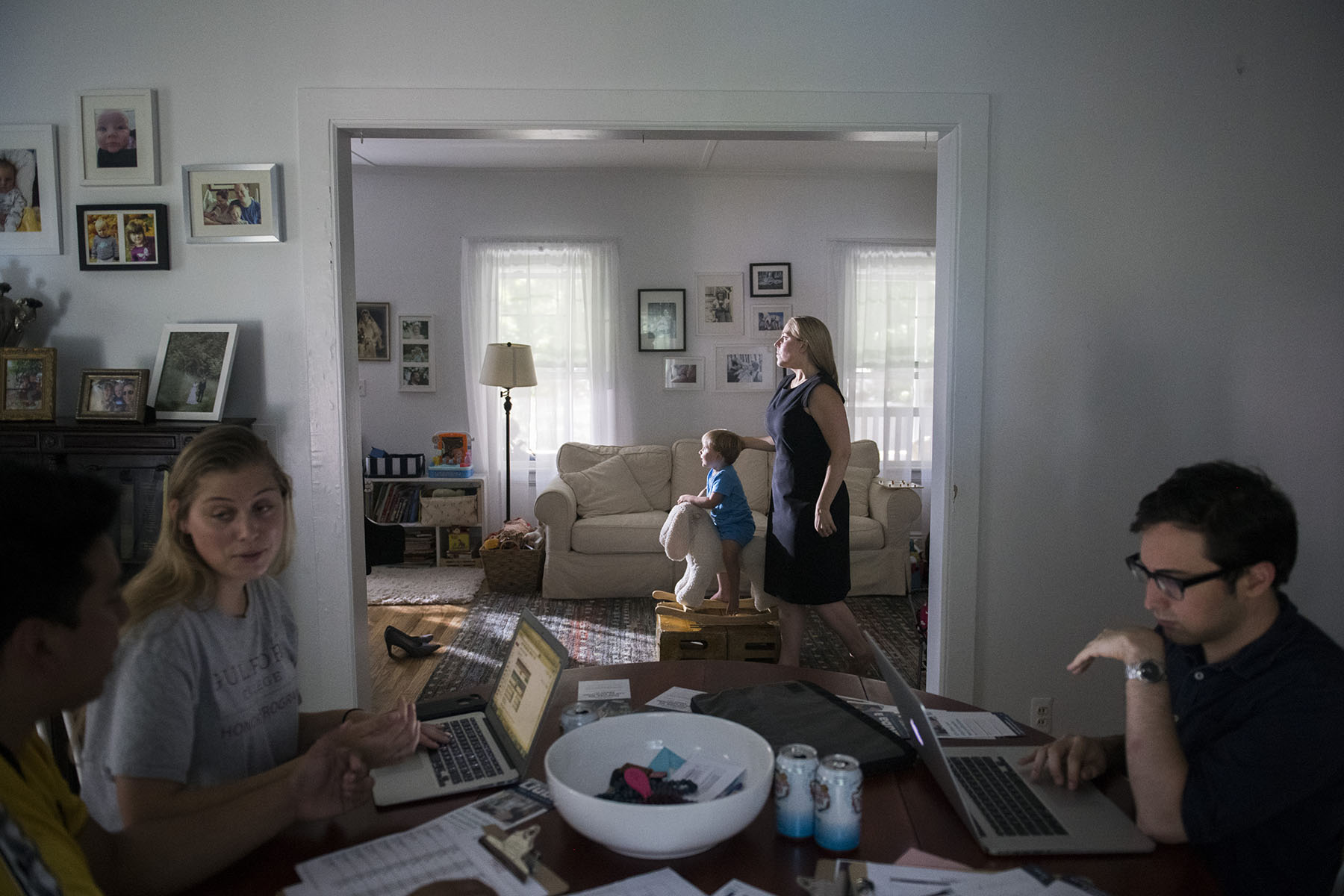When Liuba Grechen Shirley ran for Congress in 2018, she began a journey that helped change federal policy to ensure parents like herself could use campaign funds to pay for child care.
The Democrat has been public about her struggles with balancing a campaign and securing child care. Less known was the harassment and threats of violence that Grechen Shirley says she experienced at the time. Her car window was smashed, and anonymous calls popped up at her daughter’s nursery school, which was listed on public records filed with the Federal Election Commission (FEC).
“There were people who called and harassed the nursery school because they could find that that’s where I was spending money,” she said.
None of this deterred Grechen Shirley’s run for office, an ultimately unsuccessful bid but one that launched years of advocacy to make sure candidates at all levels of elected office could use campaign dollars for child care expenses. To date, 40 states allow its use, a recent milestone that’s taken years due to the nation’s patchwork of laws and regulations.
Now Vote Mama — the umbrella organization Grechen Shirley founded that supports parents who run for office — is elevating the use of campaign funds for security measures. Its lobbying entity has begun advocating for policies on the state level that ensure parents and others with concerns about the safety of their families have more financial means to protect themselves.
-
Read Next:
The organization’s research arm, Vote Mama Foundation, released a report on Monday that shows federal candidates are increasingly spending money on security. While the expenditures do not focus on parents, the report’s findings conclude that the increase in spending indicates a dwindling sense of safety for candidates, which “creates a barrier to entry for caregivers seeking office and discourages a new generation of candidates with young families from running for office up and down the ballot nationwide.”
The possibility that parents might forgo such political engagement is likely to impact their already limited representation in elected office: Vote Mama Foundation has collected data on mothers with minor children and estimated that they are just 8 percent of state legislators. They represent just 6.8 percent of all federal legislators.
“Campaign funds for child care opens the door for more moms to run and to serve in office, but campaign funds for security — it keeps that door open, by ensuring safety shouldn’t be a deterrent for people who want to run for elected office,” Grechen Shirley said.
Federal candidates had been able to use campaign funds for security expenses on a case-by-case basis since 2009, but an FEC rule in 2024 clarified the use of such funds for the reasonable cost of security measures for a federal candidate, federal officeholder, member of their family and employees. Among the buckets of allowable expenses:
- Security devices such as hardware, locks, alarm systems, motion detectors and security camera systems;
- Structural security devices such as wiring, lighting, gates, doors and fencing;
- Security personnel;
- Cyber security software, devices and services.
Vote Mama Foundation, which appears to be the only organization tracking security spending, analyzed security-related transactions in FEC filings between 2014 and 2024. It estimated more than 860 candidates for federal office spent over $41 million on security measures during that time — with 2020 and 2024 accounting for nearly half of all spending.
The bulk of the federal spending on security — 78 percent — was done by men, and nearly 80 percent of that amount was spent by White men. While women represent just 22 percent of security spending, women of color make up 63 percent of that amount — nearly two-thirds.
While the Vote Mama report focuses on federal campaign spending, Grechen Shirley said the new data connects the dots on the shortcomings of state-level policy, which will need to play out individually. North Dakota recently became the 10th state to allow for spending campaign funds on candidate safety — and the first since the June assassination of Minnesota state Rep. Melissa Hortman and her spouse. Lawmakers in Oklahoma have recently returned to the subject, and the Minnesota legislature now plans to cover costs for enhanced home security for lawmakers.
Vote Mama is calling on more states to allow campaign expenditures in order to empower more parents to run for and stay in office. It notes such policies should come at no expense to taxpayers since candidates would be using the money they’re raising.
Reports of harassment and threats of violence against elected officials and candidates have become more common. Bridging Divides Initiative (BDI), a nonpartisan research initiative out of Princeton University that tracks and mitigates political violence in the United States, maintains a public dataset that shows more than 250 incidents of threats and harassment targeting local officials have been reported in the first half of 2025 — up 9 percent from this point in 2024.
BDI, in partnership with the organization CivicPulse, also maintains a quarterly survey of local elected officials, and its latest findings show many officials are seeking more safety support, including for personal security and enhanced privacy protections. One in 3 women reported their gender identity as a perceived driver of the hostility they faced, compared to just 1 in 50 men.
Among recent interviews with elected officials, BDI staff say there are elected officials who are mothers who have indicated they do not plan to run for higher office explicitly because they fear the safety risks to their children. Others say they plan to wait until their kids are young adults. Some of these mothers already have safety strategies in place to limit what information they share publicly about having kids.
Shannon Hiller, executive director of BDI, said almost half of all women in the survey report that they worry about threats, harassment or attacks in the future — that’s the case for about a third of men.
“This is not just only a problem for women, but it’s important to note that this sort of climate is impacting certain types of officials even more than others,” she said.
The issue reached renewed attention following the death of Hortman and her spouse in a shooting at multiple private residences that also injured Minnesota state Sen. John Hoffman and his spouse. The alleged gunman, who reportedly had a “hit list” of multiple Democrats besides Hortman and Hoffman, has been arrested.
-
Read Next:
That follows an alleged arson at the official residence of Pennsylvania Democratic Gov. Josh Shapiro in the spring, and years of attempted attacks and threats of violence against others. Last year, after President Donald Trump was shot in the ear in an assasination attempt at a campaign event in Pennsylvania, the incident drew public condemnation from women who have been targets of political violence.
“No one should have to risk their lives to serve in office, to stand up and fight for their constituents,” Grechen Shirley said.
Debbie Walsh, director of the Center for American Women and Politics at Rutgers University, noted that running for the legislature or local office is often a low-paying part-time job, even though the public expectations can make it feel like a full-time gig. That already made it a tough sell for women candidates, especially those with young children, who must now contend with safety concerns that disproportionately impact them.
“Women make up less than a third of elected officials at any level of office. If it has a chilling effect on women running for office or running for reelection, we’re at risk of losing women’s voices,” she said. “When you lose women’s voices in these decision-making bodies — where policy is made that affects all of our lives — then you think about our democracy, it really puts in many ways our democracy at risk.”
Security spending is used across the political spectrum. From 2014 to 2024, Democrats spent more than $18 million, and Republicans spent more than $14 million. Trump spent $6.8 million on security measures, according to the report. Robert F. Kennedy Jr., who ran for president last election cycle before being tapped to be health secretary, spent $5.7 million.
Former Vice President Kamala Harris spent $1.7 million on security. In Congress, former Sen. Krysten Sinema spent $1.4 million, followed by former Rep. Cori Bush with $831,000 and Rep. Alexandra Ocasio-Cortez with $666,000.
Grechen Shirley said there is bipartisan support for addressing security concerns among elected lawmakers and candidates.
“Both Democrats and Republicans are getting threats. This is something that is common sense, and it’s already approved at the federal level,” she said. “Now we have to get this approved at the state level to make sure that people are safe.”
In a recent policy brief with the Brennan Center for Justice, BDI called for expanded access on the state-level for personal security measures and data collection on the issue. The brief also noted the Trump administration’s rollback of security protections for former officials and the president’s clemency of nearly 1,600 participants convicted in the January 6 attack on the Capitol has “created a more permissive environment for politically motivated attacks.”
Hiller said that context is important if the public wants to better understand how to address political violence.
“People have to be thinking about holding their elected leaders accountable if they’re contributing to that kind of climate and permissive environment around threats and harassment in particular,” she said.








